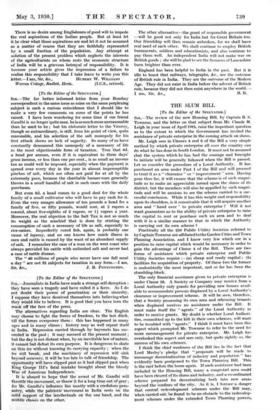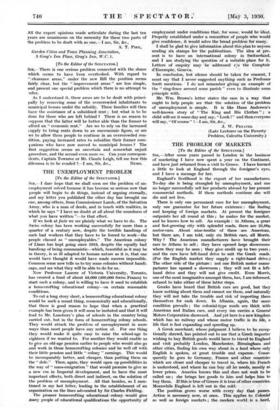THE SLUM BILL
[To the Editor of the Sehmeroa.] Sut,—The review of the new Housing Bill, by Captain B. S. Townroe, and the letter on that subject from Mr. Claude M. Leigh in your issue of Apri119th, raise the important question as to the extent to which the Government has invited the assistance of private enterprise in the coming attack on slums.
Mr. Leigh sees in Clauses 4 and 6 of the Bill a very simple method by which private enterprise all over the country can do what he has done in South London. It must not be assumed that the system which he has had the courage and foresight to initiate will be generally followed when the Bill is passed. Let us consider the procedure of a Local Authority. It has purchased an area under Part I of the Bill and will proceed to treat it as a " clearance " or" improvement area. Having gone thus far, it will ensure that the scheme is of such magni- tude as to "make an appreciable inroad upon the slums of its district, but the members will also be appalled by such magni- tude and will be anxious to see the scheme carried to a suc- cessful conclusion. While it has this weight and responsibility upon its shoulders, is it conceivable that it will acquire another area and "hand over" to private enterprise ? Will it not want guarantees as to the ability of private enterprise to raise the capital to rent or purchase such an area and to deal with it in a similar manner to that in which the Authority is carrying out its own scheme ?
Practically all the 250 Public Utility Societies referred to by Captain Townroe are affiliated to the Garden Cities and Town Planning Association, and I know very few which are in a position to raise capital which would be necessary in order to gain the advantage of Clause 4 of the Bill. There are two forms of assistance which private enterprise and Ptiblie Utility Societies require :—(a) cheap and ready capital ; (b) facilities for acquisition of property. Of these two the former is undoubtedly the most important, and so far has been the stumbling-block."
The only financial assistance given to private enterprise is under Clause 26. A Society or Company may receive from a Local Authority only grants for providing new houses avail- able to accommodate persons displaced by a Local Authority's clearance or improvement scheme. It will be seen, therefore, that a Society possessing its own area and rehousing tenants when displaced receives no assistance under the Bill. It must make itself the " agents " of the Local Authority in order to receive grants. My doubt is whether Local Authori- ties, committed up to the hilt in their own schemes, will want to be troubled with "agents." I think it must have been this aspect which prompted Mr. Townroe to refer to the need for mare encouragement for private enterprise. Mr. Leigh has Overlooked this aspect and sees only, but quite rightly so, the success of his own schemes.
• I think the chief weakness of the Bill lies in the fact that Lord Marley's pledge 'that "proposals will be made to encourage decentralization of industry and population" has evidently been postponed to the Town Planning Bill. This is the cart before the horse again. If such assistance had been included in the Housing Bill, many a congested area could have been 'cleared of its slums and industry, and a eo-ordinated scheme prepared for decentralizing both into new areas beyond the confines of the 'city. AS it is, I foresee a danger that central redevelopment schemes under the Bill may, When carried out. be found to be an obstacle tO the redevelop- ment schemes under the extended Town Planning powers. All the expert opinions made articulate during the last ten years are unanimous on the necessity for these two parts of the problem to be dealt with as one.—I am, Sir, &c., Garden Cities and Town Planning Association, 3 Gray's Inn Place, Gray's Inn, W.C.1.















































 Previous page
Previous page